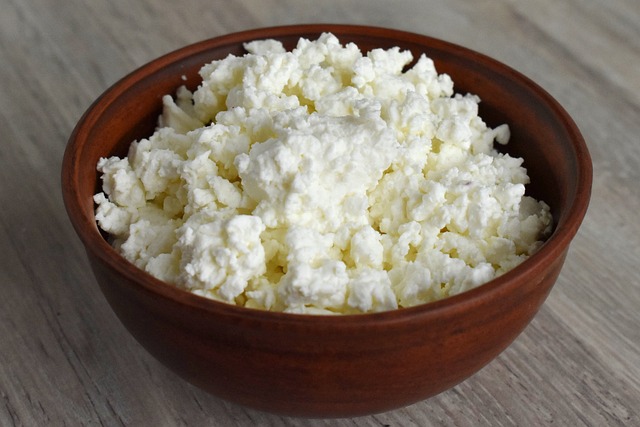
Cottage cheese is a popular dairy product enjoyed by many, but when it comes to sharing our human foods with our pets, it’s crucial to consider their nutritional needs and health implications. That is why asking “can dogs eat cottage cheese?” is a complex question. Thus, this article explores why dogs can eat cottage cheese, its benefits, potential risks, and guidelines for feeding it to your canine companion.
Table of Contents
Is Cottage Cheese Safe for Dogs?
In short, the answer is yes, dogs can eat cottage cheese in moderation. This dairy product can be a good source of protein, calcium, and other vitamins for dogs. However, it’s very important to introduce it into their diet slowly and in small amounts to be able to monitor their reaction, as some dogs may be lactose intolerant or have sensitive stomachs. Additionally, dogs can get their calcium and protein from their regular dog friendly diet and so cottage cheese can be an occasional treat offered to pups and not a staple. Despite cottage cheese being non-toxic to dogs, there are still some potential risks associated with feeding it to your pooch to be aware of:
- Lactose Intolerance: Like humans, some dogs can be lactose intolerant. Since cottage cheese does contain lactose, it can still cause digestive upset in sensitive dogs.
- High Fat Content and Calories: Some types of cottage cheese are high in fat, which can lead to weight gain or obesity and other related health issues if too much is consumed. Always choose fat-free or low-fat versions.
- Salt Content: Cottage cheese can be high in sodium, which is not good for dogs, especially those with pre-existing health issues. Always choose unsalted or low-sodium varieties.
How Much Cottage Cheese Can Dogs Eat?
When introducing cottage cheese into your dog’s diet, it’s crucial to consider their size and weight to ensure you’re providing an appropriate amount. Additionally, always consult with a vet before feeding new foods to your dog. Here is a general guideline on how much cottage cheese a dog can likely based on their size:
- Extra Small Dogs (<10 lbs): Start with a very small amount, about less than 1 teaspoon, to gauge tolerance.
- Small Dogs (10-25 lbs): Begin with up to 1 teaspoon. If there are no adverse reactions, this can be a treat size, offered on occasion.
- Medium Dogs (25-60 lbs): Try about 1-2 teaspoons. After ensuring there are no negative reactions, you can provide this amount in moderation as a treat.
- Large Dogs (60-100 lbs): Begin with up to about 1 tablespoon. If tolerated well, this can be given as a treat on occasion.
- Giant Dogs (100+ lbs): Start with 1-2 tablespoons and, if there are no issues, you can offer up this as a treat in moderation.
Remember to always introduce new snacks, like cottage cheese, gradually into your dog’s diet and observe for negative reactions. Additionally, before offering any new foods to your pup, consult with your veterinarian for personalized advice. Treats, including cottage cheese, should not make up more than 10% of your dog’s daily caloric intake to ensure they have a balanced diet. If choosing to offer your dog some cottage cheese, opt for low-fat or fat-free and low-sodium varieties.
Nutritional Benefits of Cottage Cheese
There are some health benefits of cottage cheese, not only for humans but for pooches as well. Some of these include:
- Protein-Rich: Cottage cheese is a good source of protein, which is important for a dog’s muscle growth and repair.
- Calcium Content: Of course, cottage cheese contains calcium, which can be helpful for bone and teeth strength.
- Probiotics: Some cottage cheeses contain probiotics, which can help with a dog’s gut health, although it is not as common as in other dairy products like yogurt.
Preparation Tips
When offering your dog a new food, like cottage cheese, there are certain precautions to take to ensure you are keeping them as safe as can be. The below tips are helpful guidelines, but always be sure to first consult with a veterinarian first for personalized advice, as your pup is unique.
- Introduction: Start with a small amount to see how your dog reacts. Generally, a bit less than a teaspoon is sufficient for a small dog, while around a tablespoon can usually be offered to larger breeds, depending on their health and tolerances.
- Frequency: Cottage cheese should be an occasional treat, not a regular part of your dog’s diet. Majority of your dog’s nutrition should come from balanced sources and from foods that are specifically formulated for canine consumption.
- Observation: Watch for any signs of negative reactions like signs of digestive distress, such as diarrhea, vomiting, or gas. If any of these occur, discontinue feeding cottage cheese and consult your veterinarian.

Allergies
Cottage cheese allergies in dogs are a lot less common than allergies to other foods, but it can still occur. If your dog is allergic to cottage cheese, they might exhibit one or more of the following symptoms:
- Skin Irritations: Keep an eye out for redness, rashes, hives, or excessive itching and scratching.
- Gastrointestinal Issues: Some dogs might also show signs of abdominal discomfort or a reduced appetite if they have an allergy. More common symptoms are vomiting, diarrhea, or excessive gas.
- Ear Infections: Dogs with food allergies might develop ear infections, which could be accompanied by a bad odor, discharge, or excessive scratching and shaking of the head.
- Respiratory Problems: Although less common, some allergic reactions can lead to respiratory issues such as coughing, wheezing, or difficulty breathing.
- Anaphylaxis: In rare cases, a severe allergic reaction could lead to anaphylaxis, a life-threatening condition that requires immediate veterinary attention. Symptoms include sudden difficulty breathing, swelling of the face or legs, and collapse.
If you notice any of these symptoms after feeding your dog cottage cheese, discontinue feeding it immediately and consult with your veterinarian. They can help determine if the symptoms are indeed due to an allergy and recommend appropriate diagnosis and treatment. If the symptoms are severe, immediately seek emergency veterinary care.
Cottage cheese can be a safe treat for dogs when given in moderation. It’s essential to choose low-fat, low-sodium varieties and to slowly introduce it to them. Always observe your dog’s reaction and consult with a veterinarian before introducing new foods into your dog’s diet. As with any treat, cottage cheese should not replace a balanced, pet-appropriate diet for your dog.
FAQ
Can Dogs Eat Cottage Cheese with Peaches?
Dogs can eat peaches in moderation, so adding them into cottage cheese is generally okay. Be sure to only offer this to them in small amounts on occasion, and remember that it is always best to consult with a vet first before offering dogs new foods. Be sure to remove the pit and follow the necessary precautions before offering peaches to pups.
Can Dogs Eat Cottage Cheese with Chives?
No, dogs can not eat cottage cheese with chives. This is because chives, onions, and garlic are all toxic to dogs. Cottage cheese that has chives in them, or adding chives to cottage cheese and then feeding it to your dog is very dangerous. Do not feed dogs anything with onions, chives, or garlic in it.
Can Dogs Eat Cottage Cheese for Upset Stomach?
Offering dogs a little bit of plain cottage cheese for an upset stomach or diarrhea could help with digestive issues because of the probiotics in it. It’s best to contact a vet if the issues persist and get a professional diagnosis and treatment plan if needed.
Is Cream Cheese or Cottage Cheese Better for Dogs?
Plain cream cheese can be okay for some dogs to eat in moderation. However, oftentimes cream cheese varieties will contain certain seasonings or mixings that are toxic for dogs. For example, chives, onions, and garlic cream cheeses are very dangerous to dogs and you should avoid feeding it to them at all costs.
Recipes
Cottage cheese can be a nutritious addition to your dog’s diet when used in moderation. Here are some simple recipes incorporating cottage cheese that you can prepare for your furry friend:
Cottage Cheese and Pumpkin Puree
- Ingredients:
- 2 tablespoons low-fat cottage cheese
- 2 tablespoons pumpkin puree (ensure it’s plain, not the spiced pie filling)
- Instructions:
- Mix the cottage cheese and pumpkin puree in a bowl until well combined.
- When small amounts are offered in moderation, this can be a gentle, fibrous snack for dogs with an upset stomach.
Cottage Cheese and Fruit Medley
- Ingredients:
- 2 tablespoons low-fat cottage cheese
- 1/4 cup diced apples (ensure no seeds)
- 1/4 cup blueberries
- Instructions:
- Mix the cottage cheese with the diced apples and blueberries in a bowl.
- Serve a little bit of this medley as a cool treat, especially on warm days.
- Make sure to use dog-safe fruits and avoid anything toxic to dogs, like grapes or raisins.


